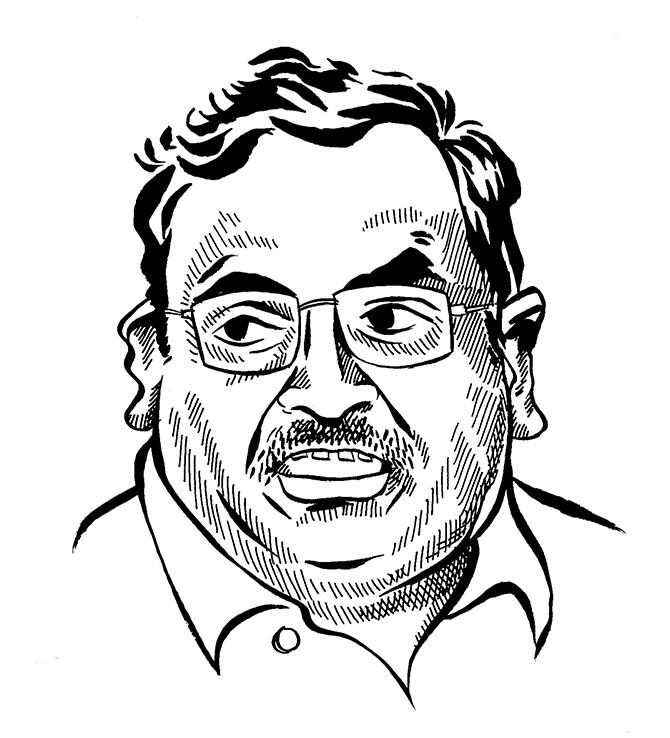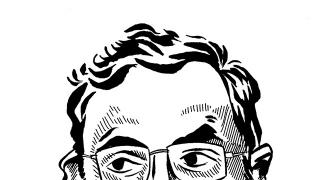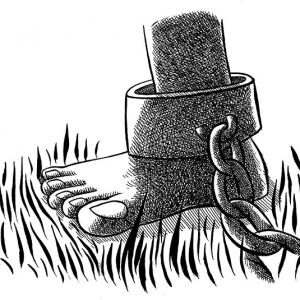Fed up with the treatment at the Nagpur central jail, his advocate has decided he will no longer deliver anything for Professor Saibaba, leaving it to the jail authorities to fulfill their legal responsibility to look after the professor.
Jyoti Punwani reports.

Is it the job of jail staff to ask lawyers why they, instead of family members, have brought supplies for prisoners?
That's what Nagpur Central Jail staff have been doing, alleges a letter written to Nagpur Jail Superintendent Anup Kumre by Aakash Sorde, Professor G N Saibaba's lawyer. The 90% handicapped professor of English was sentenced to life in March 2017 for having links with Maoists.
Professor Saibaba's wife and daughter live in Delhi where he used to teach at the Ram Lal Anand college, hence they cannot come to Nagpur to deliver the essentials needed for a wheelchair-bound man suffering from multiple ailments, and given to dizzy spells in the unbearable conditions of his confinement.
The three page letter dated December 24, the date of his last visit, describes the arbitrary methods of the Nagpur jail staff, who keep the advocate waiting for hours and then accept and reject supplies at will without giving reasons.
Fed up with this treatment, Advocate Sorde has decided he will no longer deliver anything for Professor Saibaba, leaving it to the jail authorities to fulfill their legal responsibility to look after the professor.
Advoate Sorde as sent copies of the letter to the Maharshtra home department and to the secretary of the Bar Councils of Maharashtra and Goa.
Thanks to denial of medical treatment in jail since his conviction, Professor Saibaba has lost the use of one arm. One of the items delivered by his lawyer was a medical hand weight advised for physiotherapy for his arm.
Advocate Sorde does not know if the hand weight will be delivered to him, since it was not tick marked by the jail staff on the list of items submitted by him.
The only items tick-marked are: 10 of the 17 medicines he took for his client, two underwear, a lungi and a notebook.
The jail staff put a cross tick for shampoo, even though Professor Saibaba had requested it for dandruff.
The extent of arbitrariness of the jail staff can be gauged from just one fact: The last time Advocate Sorde delivered supplies, the jail staff scolded him for not bringing shampoo which had been asked for by Professor Saibaba. This time, they refused to accept it.
As a prisoner, Professor Saibaba must make a list of what his family should send. After approval by the jail authorities, the list is sent to the family.
Despite this elaborate supervision, more than half the items were rejected.
These included a woolen cap, two napkins and handkerchiefs, a towel and a T shirt.
Nagpur minimum temperatures are currently at 11 degrees.
The disabled professor has always been extra-sensitive to the cold that aggravates his joint pain.
Indeed, in October 2017, before winter had set in, Professor Saibaba wrote to his wife Vasantha:
'Already I am shivering with continuous fever. I do not have a blanket. I do not have a sweater/jacket. As temperature goes down excruciating pain continuously in my legs and left hand increases. I am living here like an animal taking its last breaths.'
It is Professor Saibaba's willpower that has enabled him to continue living in jail with dignity, despite all attempts by the jail staff to deny that to him.
Thus on December 24, they denied him not just essential medicines but also blank writing paper, one issue of India Today, and three books: Gautam Bhatia's `The Transformative Constitution, an English translation of Tamil writer Perumal Murugan's Amma and Kashmiri writer Mirza Wahid's Tell Her Everything.
In October, Professor Saibaba announced that he was going on a hunger strike in protest against the denial of medical care and essentials by the Nagpur jail authorities, despite his family sending them for him.
These included letters and reading material from his family. The next day, the deputy inspector general prisons assured him that he would receive whatever he needed.
The DIG's promise turned out hollow.
Jail authorities are not known to be humane. But Nagpur jail authorities have been particularly inhuman towards Professor Saibaba, even ignoring court orders that would make his life easier in the anda cell to which he is confined.
As an undertrial too, Professor Saibaba had gone on hunger strike for the same reason: Denial of medical treatment.
Given his handicap, Professor Saibaba needs two assistants to help him perform necessary functions. The jail authorities never gave him assistants, but till early this year, fellow prisoners would themselves help him.
In March, he wrote to his wife that his helpers were reluctant to help him given his precarious physical condition; they weren't confident of handling him.
There has been mental cruelty too.
Professor Saibaba was also denied parole twice to visit his cancer-stricken mother, despite his wife Vasantha writing to Nationalist Congress Party President Sharad Pawar and Maharashtra Home Minister and NCP politician Anil Deshmukh.
He was not even allowed to make a video all to his mother in her last days nor was he allowed parole to perform her last rites.
Stricken with post-polio paralysis since he was 5, Professor Saibaba was nurtured to be independent by his mother. He last saw her when she visited him in jail in 2017.
After the visit, he wrote a poem to her: `Mother, weep not for me, one verse of which read:
Mother, lose not your hope
I realised that jail is not death
it is my rebirth
and I will return home
to your lap that nurtured me
with hope and courage.
Thanks to the callousness of the government, he could not fulfill that promise to his mother.
Though the Bombay high court and the Supreme Court gave him bail when he was an undertrial in 2015 and 2016, after his conviction, he has been refused bail twice, last in July this year. The court also upheld the denial of parole to him.
Courts have not ensured that their orders regarding medical treatment to him have been carried out. As an undertrial, they showed more concern, with one judge even visiting him in jail. However, after his conviction, they have chosen to believe the claims made by jail authorities that he is being provided adequate medical treatment.
In his letter, his lawyer writes:
'To this day, I kept on religiously bringing and giving you necessities for a 90% paralysed inmate, ignoring the treatment meted out to me. However I now call it quits.
'The humiliation is unbearable, your conduct incorrigible, illogical and inhuman. I, however, put you to notice on instruction of the wife of Prof G N Saibaba, that shall my client suffer any health hazard or deterioration or denial of any fundamental requirement, you in person shall be held responsible for damages and sued in appropriate court of law.'
Will this letter make any difference to the Nagpur Central Jail?










